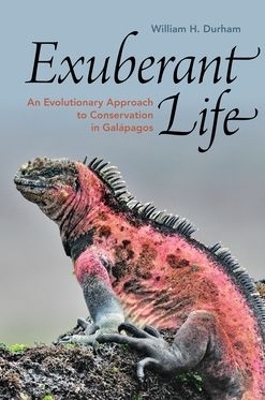
Exuberant Life
Oxford University Press Inc (Verlag)
978-0-19-753151-8 (ISBN)
The terrestrial organisms of the Galápagos Islands live under conditions unlike those anywhere else. At the edge of a uniquely rich mid-ocean upwelling, their world is also free of mammalian predators and competitors, allowing them to live unbothered, exuberant lives. With its giant tortoises, marine iguanas, flightless cormorants, and forests of giant daisies, there's no question that this is a magnificent place.
Long before people traversed the Earth, evolution endowed native species with adaptations to these special conditions and to perturbations like El Niño events and periodic droughts. As the islands have grown ever-more connected with humanity, those same adaptations now make its species vulnerable. Today, the islands are best viewed as one big social-ecological system where the ability of each native organism to survive and reproduce is a product of human activity in addition to ecological circumstances.
In this book, William H. Durham takes readers on a tour of Galápagos and the organisms that inhabit these isolated volcanic islands. Exuberant Life offers a contemporary synthesis of what we know about the evolution of its curiously wonderful organisms, how they are faring in the tumultuous changing world around them, and how evolution can guide our efforts today for their conservation.
The book highlights the ancestry of a dozen specific organisms in these islands, when and how they made it to the Galápagos, as well as how they have changed in the meantime. Durham traces the strengths and weaknesses of each species, arguing that the mismatch between natural challenges of their habitats and the challenges humans have recently added is the main task facing conservation efforts today. Such analysis often provides surprises and suggestions not yet considered, like the potential benefits to joint conservation efforts between tree finches and tree daisies, or ways in which the peculiar evolved behaviors of Nazca and blue-footed boobies can be used to benefit both species today. In each chapter, a social-ecological systems framework is used to highlight links between human impact, including climate change, and species status today,
Historically, the Galápagos have played a central role in our understanding of evolution; what these islands now offer to teach us about conservation may well prove indispensable for the future of the planet.
William H. Durham is Bing Professor in Human Biology, Emeritus, and Yang and Yamazaki University Fellow, Emeritus, at Stanford University. He's focused his career on two things. The first is putting the principles of evolution to work in understanding and sustaining biological and cultural diversity. The second is identifying the social dimensions of environmental problems and how to solve them. Durham is a recipient of the MacArthur Prize Fellowship, and he previously served 16 years as Editor of the Annual Review of Anthropology. At Stanford University, he has served as both Chair and Co-Chair of Anthropology as well as Director of Human Biology. Durham is currently Co-Director of "The Osa and Golfito Initiative," Stanford's sustainability project in Costa Rica.
Preface
Chapter 1: Out of the Ordinary
Chapter 2: Tough Times for the Loneliest Albatross
Chapter 3: The "Secret Recipe" of Galápagos
Chapter 4: Galápagos Derailed
Chapter 5: Beautiful on the Inside
Chapter 6: "An Inexplicable Confusion"
Chapter 7: Caught in a Booby Trap
Chapter 8: Not Earthbound Misfits After All
Chapter 9: Fishing in a Common Pool
Chapter 10: One Big Social-Ecological System
Appendix 1: An Evolution Primer
Appendix 2: Treasured Islands-How to Help
References
Index
| Erscheinungsdatum | 06.04.2021 |
|---|---|
| Verlagsort | New York |
| Sprache | englisch |
| Maße | 155 x 239 mm |
| Gewicht | 816 g |
| Themenwelt | Naturwissenschaften ► Biologie ► Evolution |
| Naturwissenschaften ► Biologie ► Genetik / Molekularbiologie | |
| Naturwissenschaften ► Biologie ► Ökologie / Naturschutz | |
| Technik ► Umwelttechnik / Biotechnologie | |
| ISBN-10 | 0-19-753151-2 / 0197531512 |
| ISBN-13 | 978-0-19-753151-8 / 9780197531518 |
| Zustand | Neuware |
| Informationen gemäß Produktsicherheitsverordnung (GPSR) | |
| Haben Sie eine Frage zum Produkt? |
aus dem Bereich


